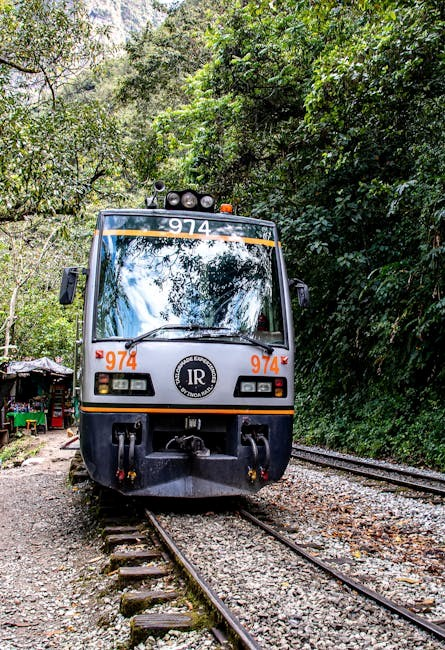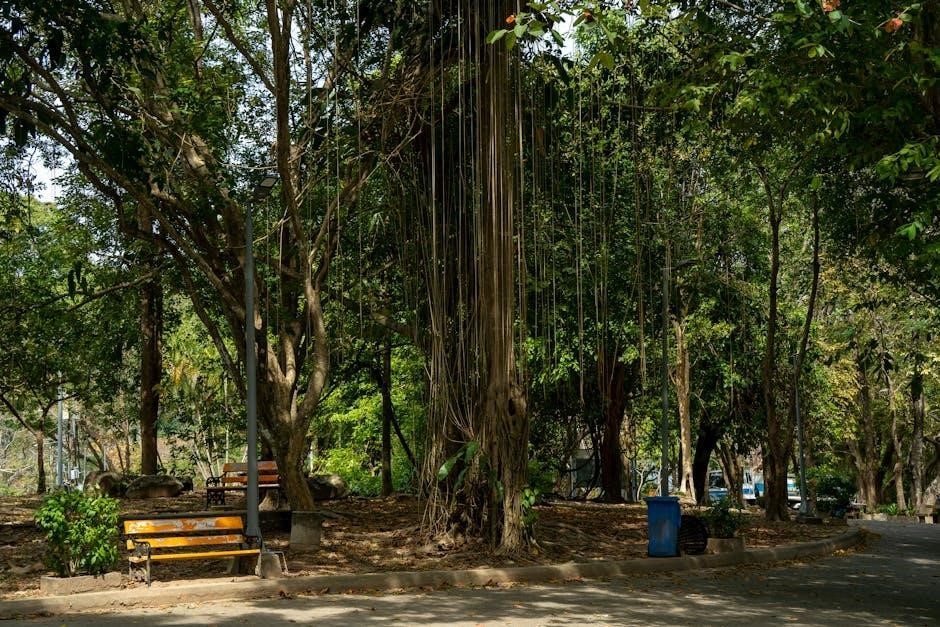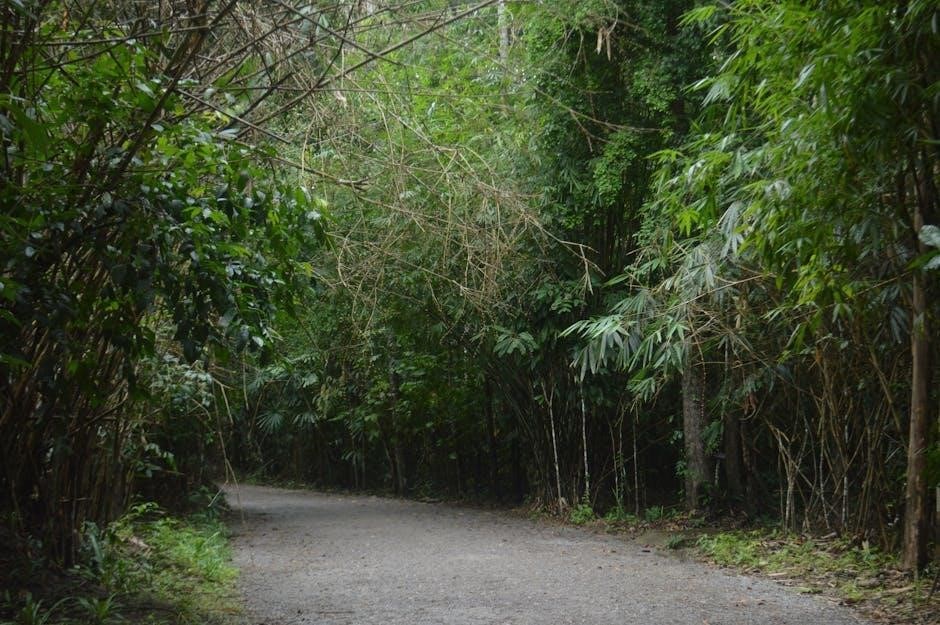Upton Sinclair’s The Jungle is a groundbreaking novel exposing the harsh realities of immigrant life and the meatpacking industry in early 20th-century America.
1;1 Overview of the Novel
The Jungle, written by Upton Sinclair in 1906, is a gripping tale of Lithuanian immigrants seeking the American Dream in Chicago. The novel follows Jurgis Rudkus and his family as they face exploitation in the meatpacking industry. Sinclair vividly portrays the harsh working conditions, poverty, and corruption, exposing the darker side of capitalism. The story highlights the struggle for survival and the eventual awakening to socialist ideals. This landmark novel not only sparked public outrage but also led to significant reforms in labor and food safety laws. Available in PDF and other formats, it remains a powerful critique of societal injustices and a cornerstone of American literature.
1.2 Upton Sinclair’s Background and Motivations
Upton Sinclair was a renowned American journalist, novelist, and socialist. Born in 1878, he grew up in poverty, which deeply influenced his writing and activism. Sinclair was motivated by a desire to expose the exploitation of workers and the corruption of capitalist systems. His socialist beliefs and firsthand observations of the meatpacking industry inspired The Jungle. The novel was not only a literary masterpiece but also a call to action, reflecting Sinclair’s commitment to social justice and reform. His work remains a testament to the power of literature to drive change.
1.3 Historical Context of the Early 20th Century
The early 20th century was marked by industrialization, immigration, and social inequality in America. Millions of immigrants, like Jurgis and his family, arrived seeking opportunities but faced exploitation. The meatpacking industry, dominated by corporations, subjected workers to dangerous conditions and low wages. Progressive movements and muckraking journalism emerged to challenge these issues. Sinclair’s The Jungle became a catalyst for reform, highlighting the need for labor rights and food safety regulations, ultimately shaping public consciousness and political action during this transformative period.

Plot Summary and Key Themes
The Jungle follows Jurgis and his family as they navigate the harsh realities of immigrant life in Chicago, exposing exploitation, poverty, and the struggle for survival, climaxing in Jurgis’s adoption of socialist ideals to challenge societal injustice.
2.1 The Story of Jurgis and His Family
The novel centers on Jurgis Rudkus, a young Lithuanian immigrant, and his family, who move to Chicago seeking a better life. Driven by hope, they endure brutal working conditions in the meatpacking industry. However, their dreams are shattered by exploitation, poverty, and personal tragedies. Jurgis’s determination to support his family is tested as they face unimaginable hardships, leading to a devastating downward spiral. The story explores their resilience, loss, and the ultimate disillusionment with the American Dream, highlighting the human cost of industrial exploitation.
2.2 The Harsh Realities of the Meatpacking Industry
The novel vividly portrays the gruesome and unsanitary conditions within Chicago’s meatpacking factories. Workers, including Jurgis, toil in dangerous environments with minimal pay and no protections. Sinclair details the contamination of meat products, the exploitation of labor, and the disregard for worker safety. These depictions shocked the public, revealing the industry’s dark underbelly and prompting calls for reform. The harsh realities exposed in the novel led to significant changes in food safety regulations and labor laws, highlighting the need for accountability and ethical practices in industrial operations.
2.3 The Struggle for Survival and Social Justice
Jurgis and his family face relentless adversity, battling poverty, exploitation, and despair. Sinclair highlights their resilience and the collective struggle of workers seeking justice. The novel underscores the systemic oppression of immigrants and the working class, revealing how capitalist structures perpetuate inequality. Through their hardships, Sinclair advocates for socialism as a potential solution, emphasizing the need for collective action and reform. This struggle for survival and justice remains a powerful commentary on societal inequities and the fight for human dignity.

Major Characters and Their Roles
Jurgis Rudkus, the protagonist, leads his family through trials, while Ona and Antanas embody the tragic consequences of exploitation, shaping the novel’s emotional and social commentary.
3.1 Jurgis Rudkus: The Protagonist
Jurgis Rudkus, the protagonist, is a young Lithuanian immigrant seeking a better life in America. His determination and strength initially fuel his family’s hopes, but the harsh realities of the meatpacking industry and personal tragedies gradually break him. Jurgis’s journey from optimism to despair and eventual embrace of socialism underscores the novel’s critique of capitalist exploitation and the resilience of the human spirit in the face of overwhelming adversity.
3.2 Ona Lukoszute: The Tragic Heroine
Ona Lukoszute, Jurgis’s wife, is a symbol of resilience and tragic fate. Her marriage to Jurgis brings hope, but the brutal conditions of their new life soon overwhelm her. Ona’s quiet strength and devotion to her family contrast with the relentless hardships she endures, including exploitation and personal loss. Her eventual breakdown and tragic end highlight the devastating impact of the oppressive system on vulnerable individuals, making her a poignant representation of the human cost of industrial exploitation in early 20th-century America.
3.3 Antanas Rudkus: Jurgis’s Father
Antanas Rudkus, Jurgis’s father, represents the struggles of elderly immigrants in America. His optimism and desire for a better life initially sustain the family. However, the harsh realities of the meatpacking industry and poor working conditions soon take a toll on his health. Antanas’s eventual decline and death symbolize the devastating impact of exploitation on vulnerable individuals, highlighting the loss of hope and the fragility of life in the face of industrial brutality and societal indifference.
Themes and Symbolism
The Jungle explores themes of exploitation, inequality, and the struggle for justice, with the meatpacking factory symbolizing capitalist oppression and societal decay.

4.1 The Jungle as a Metaphor for Capitalist Society
Upton Sinclair’s The Jungle uses the jungle as a metaphor for capitalist society, depicting it as a ruthless system where survival depends on strength and cunning. The novel portrays the exploitation of workers, their dehumanization, and the struggle to survive in a system driven by greed. Sinclair’s vivid descriptions of the meatpacking factory mirror the broader societal inequality, highlighting how capitalism preys on the vulnerable. This metaphor underscores the need for systemic change to combat oppression and injustice, resonating with Sinclair’s socialist ideals and the era’s progressive reforms.
4.2 The Symbolism of the Meatpacking Factory
The meatpacking factory in The Jungle symbolizes the exploitative nature of industrial capitalism. Sinclair’s graphic descriptions of the factory’s operations reveal a system that dehumanizes workers, prioritizing profit over safety and human dignity. The factory represents a machine that consumes lives, mirroring the broader societal exploitation of immigrant labor. This symbolism serves as a powerful critique of unchecked industrialization and the lack of worker protections, driving home the urgent need for reform and social change.
4.3 The Role of Socialism in the Novel

Socialism plays a pivotal role in The Jungle as a beacon of hope and justice for the oppressed workers. Sinclair, a staunch socialist, uses the novel to critique capitalism and advocate for collective action. The harsh realities of exploitation and inequality are contrasted with the ideals of socialism, which promises fairness and equality. The novel’s ending, with its optimistic vision of a socialist future, underscores Sinclair’s belief in the transformative power of socialism to address the systemic injustices faced by workers.
Writing Style and Literary Significance
Sinclair’s vivid, graphic descriptions exposed harsh realities, sparking reforms. His muckraking style influenced American literature, making The Jungle a landmark in the progressive movement and social critique.
5.1 Sinclair’s Realistic and Graphic Descriptions
Upton Sinclair’s vivid and unsettling descriptions in The Jungle exposed the gruesome realities of the meatpacking industry. His graphic portrayal of unsanitary conditions, animal slaughter, and worker exploitation shocked readers, sparking widespread outrage. Sinclair’s realistic style, often described as muckraking journalism, aimed to provoke change by revealing the harsh truths of capitalist exploitation. His detailed depictions of factory life and immigrant struggles made the novel a powerful tool for social critique, cementing its place in American literary history and advocating for reform.
5.2 The Influence of “The Jungle” on American Literature
The Jungle significantly impacted American literature by pioneering the muckraking genre, influencing social reform, and inspiring future writers. Sinclair’s exposé on industrial abuses set a precedent for investigative journalism and socially conscious fiction. The novel’s graphic realism and focus on worker exploitation reshaped public consciousness, leading to legislative changes. Its legacy continues to inspire authors addressing social injustices, solidifying its role as a cornerstone of American literary activism and a catalyst for progressive movements in the early 20th century.
5.3 The Novel’s Place in the Muckraking Tradition
The Jungle is a seminal work in the muckraking tradition, a literary and journalistic movement aimed at exposing social and industrial abuses. Sinclair’s graphic portrayal of the meatpacking industry aligns with the movement’s goals of provoking reform through shocking revelations. The novel’s influence helped establish muckraking as a powerful force in American literature, inspiring other writers to tackle similar issues of corruption and injustice. Its bold, unflinching style remains a cornerstone of this tradition, emphasizing the power of storytelling to drive societal change.

Social and Political Impact
The Jungle exposed the meatpacking industry’s corruption, sparking public outrage and leading to reforms like the Meat Inspection Act, significantly influencing American labor and food safety policies.
6.1 The Exposure of the Meatpacking Industry
Upton Sinclair’s The Jungle revealed shocking truths about the American meatpacking industry, exposing unsanitary practices, exploitative labor conditions, and the plight of immigrant workers. Sinclair’s vivid descriptions of diseased animals, contaminated meat, and hazardous workplaces horrified the public. The novel’s graphic portrayal led to widespread outrage, prompting federal investigations and reforms. Its impact was instrumental in the passage of the Meat Inspection Act of 1906, which mandated safer food processing standards and greater government oversight of the industry.
6.2 Public Reaction and Reforms
The public reaction to The Jungle was immense, sparked by Sinclair’s graphic depictions of the meatpacking industry’s horrors. Widespread outrage led to demand for change, prompting President Theodore Roosevelt to commission an investigation. The subsequent findings confirmed Sinclair’s allegations, leading to the passage of the Meat Inspection Act of 1906. This legislation mandated federal oversight of meatpacking plants, ensuring cleaner and safer practices. The reforms marked a significant victory for consumer rights and workplace safety, driven by the novel’s explosive revelations.

6.3 The Role of the Novel in the Progressive Movement
The Jungle played a pivotal role in the Progressive Movement by highlighting the plight of workers and immigrants. Sinclair’s exposé fueled public support for reform, aligning with Progressives’ goals of social and economic change. The novel’s influence extended beyond literature, inspiring political action and contributing to the movement’s momentum. Its impact underscored the power of muckraking journalism in driving societal transformation, making it a cornerstone of Progressive Era activism and a testament to the enduring influence of Sinclair’s work.
Availability and Formats
The Jungle is widely available in various formats, including PDF, EPUB, and Kindle. Readers can download it for free or access it online through multiple platforms.
7.1 The Novel in PDF Format
The Jungle by Upton Sinclair is readily available in PDF format, offering readers a convenient way to access the novel. The PDF version preserves the original text’s clarity and formatting, ensuring an authentic reading experience. It can be downloaded from various online platforms, including academic archives and digital libraries. Many sites provide free access, making it easily accessible to the public. The PDF format is compatible with multiple devices, allowing readers to enjoy the book on smartphones, tablets, or computers. This accessibility has helped maintain the novel’s relevance and widespread readership over the years.
7.2 Free Download Options and Online Availability

Readers can freely download The Jungle in PDF from numerous online platforms, including academic databases and digital libraries. Many websites offer the novel without registration or payment, ensuring accessibility for everyone. The PDF version is widely available due to its public domain status, making it easy to find and download. This accessibility has contributed to the novel’s enduring popularity and educational use, allowing it to reach a broad audience and remain a significant work in American literary history.
7.4 Comparisons with Other Editions (e.g., EPUB, Kindle)
The PDF version of The Jungle is widely popular for its readability and faithfulness to the original text. Compared to EPUB and Kindle formats, PDFs maintain the book’s layout and typography, making them ideal for academic or archival purposes. EPUB and Kindle editions, however, offer reflowable text, enhancing readability on various devices. While PDFs are easier to share, EPUB and Kindle formats provide adjustability for font size and screen adaptation, catering to modern readers’ preferences. Each format serves different needs, ensuring accessibility across platforms.

Adaptations and Interpretations
The Jungle has been adapted into films, stage plays, and reinterpretations, each capturing its powerful themes of exploitation and social justice, resonating across different mediums and audiences.

8.1 Film and Stage Adaptations
The Jungle has been adapted into films and stage plays, with the 1914 silent film being a notable example. These adaptations highlight the novel’s themes of exploitation and social injustice, bringing Sinclair’s vivid descriptions to life. The 2014 stage adaptation in Chicago also captured the essence of the story, emphasizing the struggles of immigrants and workers. Such interpretations have helped preserve the novel’s relevance, making its powerful message accessible to new audiences across different mediums.
8.2 Critical Analysis of the Novel’s Adaptations
Critical analysis of The Jungle’s adaptations reveals both successes and challenges. Film versions, like the 1914 silent adaptation, were praised for their visual representation of the meatpacking horrors but criticized for omitting key political themes. Stage productions, such as the 2014 Chicago adaptation, were lauded for their immersive storytelling but faced logistical challenges in depicting the novel’s vast scope. Overall, adaptations have struggled to fully capture Sinclair’s complex narrative but remain vital in keeping his message alive for contemporary audiences.
8.3 The Novel’s Influence on Modern Media
The Jungle has profoundly influenced modern media, inspiring documentaries, films, and series that address social inequality and corporate exploitation. Its themes are echoed in contemporary works like Food, Inc. and Fast Food Nation, which expose similar industrial abuses. Sinclair’s muckraking style has also shaped investigative journalism and storytelling, ensuring his legacy endures in today’s media landscape. The novel’s impact continues to resonate, driving conversations about labor rights and consumer awareness.
Educational and Academic Relevance
The Jungle remains a vital educational resource, widely taught in schools and universities. Its themes of social justice and economic inequality make it a cornerstone of academic studies.
9.1 “The Jungle” in School Curricula
The Jungle is widely incorporated into high school and college curricula, serving as a cornerstone for teaching American literature, history, and social studies. Its vivid portrayal of immigrant struggles, workplace exploitation, and the rise of socialism provides rich material for critical thinking and discussion. The novel aligns with educational standards, fostering empathy and understanding of early 20th-century America. Educators often highlight its relevance to themes of social justice, capitalism, and reform, making it a valuable tool for engaging students in complex societal issues.
9.2 Academic Studies and Essay Topics
Academic studies of The Jungle often focus on its exploration of socialism, capitalism, and labor rights. Essay topics include analyzing the novel’s portrayal of the meatpacking industry, its impact on public reforms, and Sinclair’s use of graphic imagery. Scholars also explore the novel’s historical context, its influence on the Progressive Movement, and its role in muckraking journalism. The PDF version of the novel is frequently used in academic settings, allowing students to highlight and annotate key passages for deeper analysis of themes and characters.
9.3 The Novel’s Use in Teaching Social Studies
The Jungle is widely used in social studies curricula to explore themes of immigration, labor rights, and urbanization. The PDF version is often assigned for its accessibility, allowing students to analyze historical context and societal issues. Teachers use the novel to discuss the Progressive Era and its reforms, encouraging critical thinking about social justice. It also serves as a primary source for understanding the experiences of early 20th-century immigrants, making it a valuable tool for engaging students in historical and cultural studies.
The Jungle remains a powerful critique of capitalist exploitation, with its PDF version ensuring accessibility for modern readers. Further reading on Sinclair’s work and historical context is recommended.
10.1 The Lasting Legacy of “The Jungle”
Upton Sinclair’s The Jungle left an indelible mark on American literature and society. Its exposé of the meatpacking industry led to significant reforms, including the Meat Inspection Act of 1906. The novel’s vivid portrayal of immigrant struggles and capitalist exploitation continues to resonate, making it a cornerstone of the muckraking tradition. Available in various formats, including PDF, the book remains accessible, ensuring its legacy endures for future generations to study and reflect upon its timeless themes of social justice and systemic change.
10.2 Recommendations for Further Study
For deeper understanding, readers can explore Upton Sinclair’s other works, such as Oil! and Boston, to contextualize his socialist themes. Analyzing the novel’s historical backdrop, like the Progressive Movement, enhances its relevance. Comparing the original 1905 uncensored edition with later versions provides insights into editorial changes. Additionally, academic essays and critiques, available online or in PDF formats, offer diverse perspectives on Sinclair’s impact and legacy, enriching the study of The Jungle.
10.3 The Significance of Sinclair’s Work Today
Upton Sinclair’s The Jungle remains a vital work in contemporary discussions on labor rights, corporate accountability, and social justice. Its expose of worker exploitation and food safety issues continues to resonate, influencing modern advocacy movements. The novel’s themes of inequality and systemic oppression are timeless, making it a cornerstone of American literary history. Its availability in PDF and other formats ensures accessibility for new generations, solidifying its role in educating about the past and inspiring change for the future.
